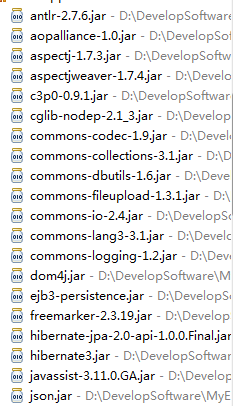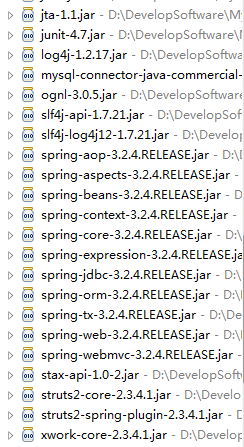Java进阶知识27 SSH整合(Struts2、Spring、Hibernate)
1、我用到的jar包


2、整合实例
2.1、MySQL数据库建表语句
1 create database school; -- 创建数据库 2 use school; -- 使用school数据库 3 4 create table user( -- 创建user表 4 id int(4) primary key auto_increment, 5 name varchar(20) not null, 6 age int(4) not null 7 );
8 inert into user(name,age) values("张三",18);
2.2、配置web.xml文件
1 <?xml version="1.0" encoding="UTF-8"?> 2 <web-app xmlns:xsi="http://www.w3.org/2001/XMLSchema-instance" xmlns="http://java.sun.com/xml/ns/javaee" xmlns:web="http://java.sun.com/xml/ns/javaee/web-app_2_5.xsd" xsi:schemaLocation="http://java.sun.com/xml/ns/javaee http://java.sun.com/xml/ns/javaee/web-app_3_0.xsd" version="3.0"> 3 <display-name></display-name> 4 <welcome-file-list> 5 <welcome-file>index.jsp</welcome-file> 6 </welcome-file-list> 7 8 <!-- Spring监听器 --> 9 <context-param> 10 <param-name>contextConfigLocation</param-name> 11 <param-value>/WEB-INF/classes/beans_*.xml</param-value> 12 </context-param> 13 <listener> 14 <listener-class>org.springframework.web.context.ContextLoaderListener</listener-class> 15 </listener> 16 17 <!-- Struts2过滤器 --> 18 <filter> 19 <filter-name>struts2</filter-name> 20 <filter-class>org.apache.struts2.dispatcher.ng.filter.StrutsPrepareAndExecuteFilter</filter-class> 21 </filter> 22 <filter-mapping> 23 <filter-name>struts2</filter-name> 24 <url-pattern>/*</url-pattern> 25 </filter-mapping> 26 </web-app>
2.3、创建实体类(User)
1 package com.shore.entity; 2 3 /** 4 * @author DSHORE/2019-11-12 5 * 6 */ 7 public class User { 8 private Integer id; 9 private String name; 10 private Integer age; 11 12 public Integer getId() { 13 return id; 14 } 15 public void setId(Integer id) { 16 this.id = id; 17 } 18 19 public String getName() { 20 return name; 21 } 22 public void setName(String name) { 23 this.name = name; 24 } 25 26 public Integer getAge() { 27 return age; 28 } 29 public void setAge(Integer age) { 30 this.age = age; 31 } 32 }
2.4、配置实体类User的hibernate文件(User.hbm.xml)
1 <?xml version="1.0" encoding="utf-8"?> 2 <!DOCTYPE hibernate-mapping PUBLIC 3 "-//Hibernate/Hibernate Mapping DTD 3.0//EN" 4 "http://www.hibernate.org/dtd/hibernate-mapping-3.0.dtd"> 5 6 <hibernate-mapping package="com.shore.entity"> 7 <class name="User"> 8 <id name="id"> 9 <generator class="native"/> 10 </id> 11 <property name="name" type="java.lang.String"/> 12 <property name="age" type="java.lang.Integer"/> 13 </class> 14 </hibernate-mapping>
2.5、创建dao层IUserDao接口类以及UserDao接口实现类
1 //接口类 2 public interface IUserDao { 3 public User getByName(String name);//根据用户名查询 4 } 5 6 //对应的接口实现类 7 public class UserDao implements IUserDao { 8 //从IoC容器注入SessionFactory 9 private SessionFactory sessionFactory; 10 public void setSessionFactory(SessionFactory sessionFactory) { 11 this.sessionFactory = sessionFactory; 12 } 13 14 @Override //根据用户名查询 15 public User getByName(String name) { 16 Query query = sessionFactory.getCurrentSession().createQuery("from User where name=:name"); //:name是命名参数 17 query.setParameter("name", name); 18 @SuppressWarnings("unchecked") 19 List<User> users = query.list(); 20 if (users != null && users.size() > 0) { 21 return users.get(0); 22 } 23 return null; 24 } 25 }
2.6、创建service层IUserService接口类以及UserService接口实现类
1 //接口类 2 public interface IUserService { 3 public User getByName(String name); 4 } 5 6 //对应的接口实现类 7 public class UserService implements IUserService { 8 9 private IUserDao userDao; 10 public void setUserDao(IUserDao userDao) { 11 this.userDao = userDao; 12 } 13 14 @Override 15 public User getByName(String name) { 16 return userDao.getByName(name); 17 } 18 }
2.7、创建UserAction
1 package com.shore.action; 2 3 import com.opensymphony.xwork2.ActionSupport; 4 import com.shore.service.IUserService; 5 6 /** 7 * @author DSHORE/2019-11-16 8 * 9 */ 10 public class UserAction extends ActionSupport{ 11 private static final long serialVersionUID = -3099218232367860074L; 12 13 private IUserService userService; 14 15 public String login() { 16 System.out.println(userService.getByName("张三")); 17 return SUCCESS; 18 } 19 20 public void setUserService(IUserService userService) { 21 this.userService = userService; 22 } 23 }
2.8、配置Spring文件(beans_common.xml)
1 <?xml version="1.0" encoding="UTF-8"?> 2 <beans xmlns="http://www.springframework.org/schema/beans" 3 xmlns:xsi="http://www.w3.org/2001/XMLSchema-instance" 4 xmlns:aop="http://www.springframework.org/schema/aop" 5 xmlns:tx="http://www.springframework.org/schema/tx" 6 xsi:schemaLocation=" 7 http://www.springframework.org/schema/beans 8 http://www.springframework.org/schema/beans/spring-beans.xsd 9 http://www.springframework.org/schema/tx 10 http://www.springframework.org/schema/tx/spring-tx.xsd 11 http://www.springframework.org/schema/aop 12 http://www.springframework.org/schema/aop/spring-aop.xsd"> 13 14 <!-- c3p0数据库连接池配置 --> 15 <bean id="dataSource" class="com.mchange.v2.c3p0.ComboPooledDataSource"> 16 <property name="driverClass" value="com.mysql.jdbc.Driver"></property> 17 <property name="jdbcUrl" value="jdbc:mysql://localhost:3306/school"></property> 18 <property name="user" value="root"></property> 19 <property name="password" value="root"></property> 20 <property name="initialPoolSize" value="3"></property> 21 <property name="maxPoolSize" value="100"></property> 22 <property name="maxStatements" value="200"></property> 23 <!--当连接池中的连接耗尽的时候c3p0一次同时获取的连接数。Default: 3 --> 24 <property name="acquireIncrement" value="2"></property> 25 </bean> 26 27 <!-- Hibernate核心配置文件(hibernate.cfg.xml)全交给Spring去管理 --> 28 <bean id="sessionFactory" class="org.springframework.orm.hibernate3.LocalSessionFactoryBean"> 29 <!-- c3p0的数据库连接池 --> 30 <property name="dataSource" ref="dataSource"></property> 31 <!-- Hibernate基础参数配置 --> 32 <property name="hibernateProperties"> 33 <props> <!-- 注意:这个是Spring配置文件,故下面的key要写全名,即:前面加上hibernate.xxxxxx --> 34 <prop key="hibernate.dialect">org.hibernate.dialect.MySQLDialect</prop> 35 <prop key="hibernate.cache.provider_class">org.hibernate.cache.NoCacheProvider</prop> 36 <prop key="hibernate.show_sql">true</prop> 37 <prop key="hibernate.format_sql">true</prop> 38 <prop key="hibernate.hbm2ddl.auto">update</prop> 39 </props> 40 </property> 41 <!-- Hibernate 映射文件的配置 --> 42 <property name="mappingLocations"> 43 <list> 44 <value>classpath:com/shore/entity/*.hbm.xml</value> 45 </list> 46 </property> 47 </bean> 48 49 <!-- dao层 --> 50 <bean id="userDao" class="com.shore.dao.impl.UserDao"> 51 <property name="sessionFactory" ref="sessionFactory"></property> 52 </bean> 53 54 <!-- service层 --> 55 <bean id="userService" class="com.shore.service.impl.UserService"> 56 <property name="userDao" ref="userDao"></property> 57 </bean> 58 59 <!-- action层 --> 60 <bean id="userAction" class="com.shore.action.UserAction" scope="prototype"> 61 <property name="userService" ref="userService"></property> 62 </bean> 63 64 <!-- ############Spring声明式事务管理配置########### --> 65 <!-- 配置事务管理器 --> 66 <bean id="transactionManager" class="org.springframework.orm.hibernate3.HibernateTransactionManager"> 67 <property name="sessionFactory" ref="sessionFactory"></property> 68 </bean> 69 70 <!-- 配置事务增强(针对DAO层) --> 71 <tx:advice transaction-manager="transactionManager" id="transactionAdvice"> 72 <tx:attributes> <!-- *代表DAO层的所有方法 --> 73 <tx:method name="*" read-only="false"/> 74 </tx:attributes> 75 </tx:advice> 76 77 <!-- AOP配置:配置切入点表达式 --> 78 <aop:config> <!-- 第一个*表示返回值类型;第二个*表示service层下的所有接口实现类;第三个*表示每个接口实现类下的所有方法 --> 79 <aop:pointcut expression="execution(* com.shore.service.impl.*.*(..))" id="pt"/> 80 <aop:advisor advice-ref="transactionAdvice" pointcut-ref="pt"/> 81 </aop:config> 82 </beans>
2.9、配置Struts2 文件(struts.xml)
1 <?xml version="1.0" encoding="UTF-8" ?> 2 <!DOCTYPE struts PUBLIC 3 "-//Apache Software Foundation//DTD Struts Configuration 2.3//EN" 4 "http://struts.apache.org/dtds/struts-2.3.dtd"> 5 6 <struts> 7 <!-- true支持动态方法调用 --> 8 <constant name="struts.enable.DynamicMethodInvocation" value="true" /> 9 <constant name="struts.devMode" value="true" /> <!-- true --> 10 11 12 <package name="user" namespace="/user" extends="struts-default"> 13 <action name="userAction" class="com.shore.action.UserAction"> 14 <result name="success">/success.jsp</result> 15 </action> 16 </package> 17 </struts>
测试结果图:


总结:
1、与传统方式相比,SSH框架 代码层(dao层、service层 等)耦合度较低,方便后期维护。
2、entity、dao、service、action层、以及db层(连接数据库)都交给spring IOC容器来管理,大大降低各层之间的耦合度,极大方便该项目后期的维护。
3、Hibernate或Spring IOC容器管理project与DB之间的连接;Spring IOC容器管理dao层(及BaseDao)、service层、action层;Struts2管理action层与前端页面的数据交互。
|
原创作者:DSHORE 作者主页:http://www.cnblogs.com/dshore123/ 原文出自:https://www.cnblogs.com/dshore123/p/11874947.html 版权声明:欢迎转载,转载务必说明出处。(如果本文对您有帮助,可以点击一下右下角的 推荐,或评论,谢谢!) |



